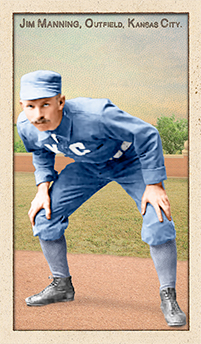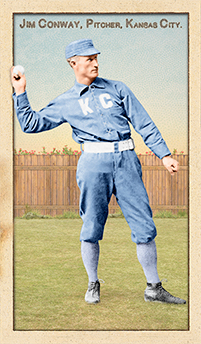
- Series: Beginnings: 1880's
- City: Kansas City
- Team: Blues (WA)
- League: Western Association
James P. Conway (1858-1912) pitched briefly in 1884 and ‘85 for the Brooklyn Atlantics and Philadelphia Athletics of the American Association. He was 3-9 for the Brooklyn and 0-1 for the A’s before returning to the minors, primarily in the Western and Southern leagues. Jim came back up with the Kansas City Blues in 1889 and had a fine season, winning 19 as the ace of a struggling team that finished 7th in the AA. The year before, Jim’s kid brother Pete had won 30 games for the Detroit Wolverines but quickly faded from the game along with Jim who’s arm gave out after that one stellar year. Jim managed to return to the mound after a year’s layoff but went only 8-12 for two minor league clubs in 1891-92.
- It has been speculated that Conway’s demise as a major-league pitcher had more to do with attitude than physical limitations. He was nicknamed “Dark Days” to signify a sour disposition
- Jim was a teammate of Hall-of-Famer Billy Hamilton who stole 111 bases in 1889
- Series: Beginnings: 1880's
- City: Kansas City
- Team: Blues (WA)
- League: Western Association
James H. Manning (1862-1929) became the first manager of the Washington Senators in their franchise-first season, 1901. Manning came out of retirement to take the helm of the fledgling D.C. enterprise after a twelve-year absence from the major leagues. As a player, Manning was an early utility man for the Boston Beaneaters, the Detroit Wolverines and the Kansas City Cowboys from 1885-1889. Manning compiled a career BA of .215 with his high year for Detroit in ’85 with .269.
- Manning was a switch hitter who played OF, 2B and Short
- He started in the OF for Boston’s second year in the NL, helping the team to a 2nd place finish in ’84 behind the Providence Grays
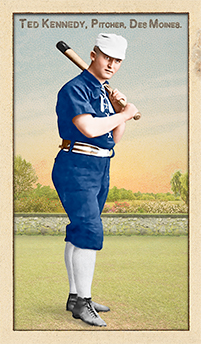
- Series: Beginnings: 1880's
- City: Des Moines
- Team: Prohibitionists
- League: Western Association
Theodore A. Kennedy (1865-1907) was an ill-starred young pitcher who learned from the best, executed effectively and, as so many of his era, flamed out early with a ruined shoulder. In our day, with Tommy John surgery nearly a rite of passage for aspiring big-leaguers, it is sobering to consider the plight of the young men of the 19th century who were thrown into unrelenting action and treated as disposable cogs in professional baseball's juggernaut. Such was the lot of Ted Kennedy. As a youth, he was ball boy in Peoria studying the not-yet-Old-Hoss Charlie Radbourn, the star pitcher for the town's very fine amateur squad. Radbourn was said to have been the first to master the overhand curve delivery that would carry him to greatness with Providence years later. Radbourn showed Ted the grip and Ted worked hard to learn it. He emerged in mid-west circles as one of the most promising young pitchers in 1884, a year of turmoil in the major leagues that left minor league teams scrambling for talent. The next season Kennedy got his break when Cap Anson brought him to Chicago. The Chicago Tribune's June 12 edition reported: “The Chicago team will place a new man in the pitcher's box today—Ned Kennedy, until recently with the Keokuk nine, and looked upon as one of the strongest unengaged pitchers in the country.” Ted's astounding strikeout record had made that reputation. Before the call-up, his highlight was 24 Ks, including 17 straight, in a game with no putouts by the first baseman against Burlington in October of '84. Sadly, Ted's arm didn't survive his rookie year. After hurling three games in two days, his shoulder gave out. Though he pitched one more year in the majors and a few in the minors, he was never the same. Kennedy later remembered, "I was terribly lame - had to pitch underhand. Every game I pitched that season it was like a rusty knife was being thrust into my shoulder."
- In retirement, Kennedy found a lucrative career in sporting goods, eventually selling out to the Spalding empire but continuing to teach youngsters how to throw the curve
- Ars Longa is indebted to the research of SABR's Craig Lammers for much of this bio
- Kennedy's uniform color on this card was changed in July, 2017 from black to blue to reflect recent reliable research by Craig Brown & friends at Threads of Our Game. One card was previously released featuring a black uniform.
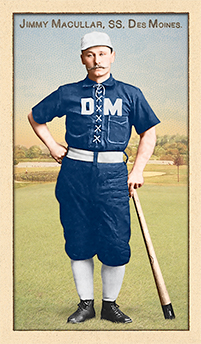
- Series: Beginnings: 1880's
- City: Des Moines
- Team: Prohibitionists
- League: Western Association
James F. Macullar (1855-1924) was a scrappy fellow with several noteworthy accomplishments. At a mere 5'6” Little Mac did not cut an imposing figure when he arrived in major league baseball by virtue of his Syracuse Stars being promoted into the National League in 1879. Macullar was the rare natural left-hander to bat right-handed, but any advantage accruing wasn't obvious as he generally hovered around the .200 mark at bat. It was in the field that he distinguished himself. By the end of his career, Macullar had set a record that still stands by playing more games (325) at shortstop than any other southpaw. That rookie season also saw Jimmy demonstrate leadership beyond his years when the twenty-four year old was given the management of the Stars for about a month. His weak hitting left him unemployed for a couple of years, but that didn't deter him from baseball. He and teammate Hick Carpenter headed to Cuba in the winter of '79-80 and became the first North Americans to play for the new league when they were signed by Colón. Despite Jimmy's limitations, he and Hick far outclassed the fledgling Cuban players and were so dominant that other teams refused to play against them. Macullar was hired by the new American Association's Cincinnati franchise in '82 and played stellar centerfield for the pennant-winners with his buddy Carpenter at third. The next season he was relegated to a utility role and his poor offensive production led to his demotion. Picked up by the Orioles, Jimmy saw regular action back at short through the 1886 season.
- Baltimore became Macullar's home and he served the city as a jailer over the next two decades.
- Jimmy contributed an outstanding play in centerfield to nail the White Sox' Abner Dalrymple at home to end the Reds' first post-season contest on October 6, 1882
- Macullar's uniform color on this card was changed in July, 2017 from black to blue to reflect recent reliable research by Craig Brown & friends at Threads of Our Game. One card was previously released featuring a black uniform.
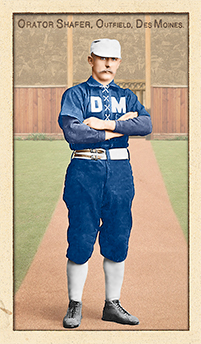
- Series: Beginnings: 1880's
- City: Des Moines
- Team: Prohibitionists
- League: Western Association
George W. Shafer (1851-1922) still ranks tenth all-time in outfield assists. The right fielder extraordinaire also continues to hold the single-season record with 50 runners cut down in 1879. Known for jawing at himself out in right if he didn’t have an umpire nearby to harangue, “Orator” was far from all talk. He had great seasons at bat and perennially ranked among the best outfielders of his day. Shafer began with the Hartford Dark Blues of the NA in 1874. Like many in the early decades of baseball, he moved around a lot. By the time he returned for a second stint with the Athletics in 1890, he had played for ten teams in 14 years. He had a great year at bat for the Indianapolis Blues in ‘78 where his .338 average was sixth in the NL. Four times he led the league in outfield assists. Orator was a key member of Cap Anson’s White Stockings, batting .304 the year he set the assist record. From 1887-89 the volatile Shafer made his living with minor league squads where he hit well and also drew a suspension for decking an umpire.
- Shafer’s final ML season was back in Philly where he was joined by younger brother (Zachary) Taylor at 2nd base
- Orator had an even 1,000 hits, good for a lifetime .282 average
- Shafer’s uniform color on this card was changed in May, 2017 from black to blue to reflect recent reliable research by Craig Brown & friends at Threads of Our Game. Two cards had been previously released featuring a black uniform.

